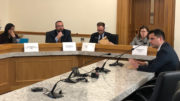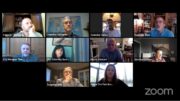By Jeffrey A. Roberts
CFOIC Executive Director
Public bodies must not be permitted to “cure” infringements of the Colorado Open Meetings Law without being held accountable to the citizens who file lawsuits to enforce compliance, the Colorado Freedom of Information Coalition argues in a brief submitted to the state’s highest court.
The Colorado Supreme Court is reviewing whether the Court of Appeals in 2023 incorrectly rejected the awarding of attorney fees to plaintiff Erin O’Connell, who successfully challenged the Woodland Park school board — at least initially — over a meeting-notice violation that the board “effectively cured” at a subsequent meeting.
The justices also are examining whether the judicially created “cure” doctrine goes against the open meetings law’s “plain meaning” and “longstanding precedent.”

“Transparency and citizen participation in government processes are among the most fundamental principles of a democracy,” says the friend-of-the-court brief filed Thursday by CFOIC, the American Civil Liberties Union of Colorado, the League of Women Voters of Colorado, the National Freedom of Information Coalition and the Parents-Safety Advocacy Group. “Allowing retroactive validation of public bodies’ prior unlaw decisions, taken in violation of the COML, while eliminating penalties for such violations eviscerates our sunshine laws.”
Drafted by attorneys Katayoun Donnelly and Steve Zansberg, CFOIC’s president, the filing says the term “cure” is a “misnomer, at least with respect to” open meetings violations. The statute “does not prevent public bodies from lawfully re-enacting the same decision by taking new actions in full compliance with COML,” they wrote. “But when they do so, public bodies remain accountable for their past violations” and “are responsible for attorneys’ fees incurred to take enforcement action against the public body.”
“By analogy,’ the brief adds, “a driver who previously exceeded the speed limit is free to drive the same stretch of roadway again, in full compliance with the posted speed limit. But her doing so does not absolve her of her prior legal infraction.”
The case concerns a vague “BOARD HOUSKEEPING” agenda item under which the Woodland Park school board in 2022 discussed a memorandum of understanding with a charter school.
A district court judge granted O’Connell’s request for a preliminary injunction, ordering the board to “clearly, honestly and forthrightly” list future agenda items pertaining to the charter school. But the judge and the appellate court later concluded she was not a “prevailing party” who is entitled to attorney fees because the board subsequently discussed and voted on the MOU at another meeting.
The Court of Appeals established the cure doctrine in 2012, holding that a state or local public body “may ‘cure’ a prior violation of the (open meetings law) by holding a subsequent complying meeting, provided the subsequent meeting is not a mere ‘rubber stamping’ of an earlier decision made in violation” of the law.
But nothing in that decision “suggests that a public body’s subsequent adoption of a policy or decision in a lawful manner can completely erase” an open meetings law violation, the CFOIC brief says, noting that the statute invalidates actions taken at meetings that don’t meet its requirements.
CFOIC and the other organizations want the Supreme Court to “set forth clear guidance” for all public bodies and courts, including a finding that “a plaintiff whose enforcement actions caused a public body to comply with the law or resulted in a judicial finding that a violation occurred is entitled to recovery of attorney fees and costs.”
The brief lists several reasons why a “cure” for violations of the law must be “contingent on the payment of attorney fees to citizens whose enforcement efforts predated the cure.” Among them: “Without the requirement to pay attorney fees, public bodies might be tempted to view the cure provision as an easy way out of compliance, knowing they can simply rectify violations if caught, without significant repercussions.”
Another: “Citizens who take steps to enforce sunshine laws … strive to maintain transparency and thereby promote accountability in government. Reimbursing them for their attorney fees recognizes their role in this process and ensures that the financial burden of enforcing compliance does not fall unfairly on individuals and organizations that challenge violations.”
The Reporters Committee for Freedom of the Press, the Colorado Press Association and the Colorado Broadcasters Association also submitted an amicus brief to the Supreme Court, focusing on the open meetings law as “one of the most essential tools at a journalist’s disposal for keeping the public informed about government activities at the state and local level.”
“If public bodies are allowed to rubber-stamp prior actions taken in clear violation of the COML’s requirements and avoid paying the attorney fees guaranteed under the Law for reporters and members of the public who successfully challenge violations of the Law, journalism will be stifled in Colorado, and the public will ultimately suffer,” it says.
Follow the Colorado Freedom of Information Coalition on X (formerly Twitter) @CoFOIC. Like CFOIC’s Facebook page. Do you appreciate the information and resources provided by CFOIC? Please consider making a tax-deductible donation.




